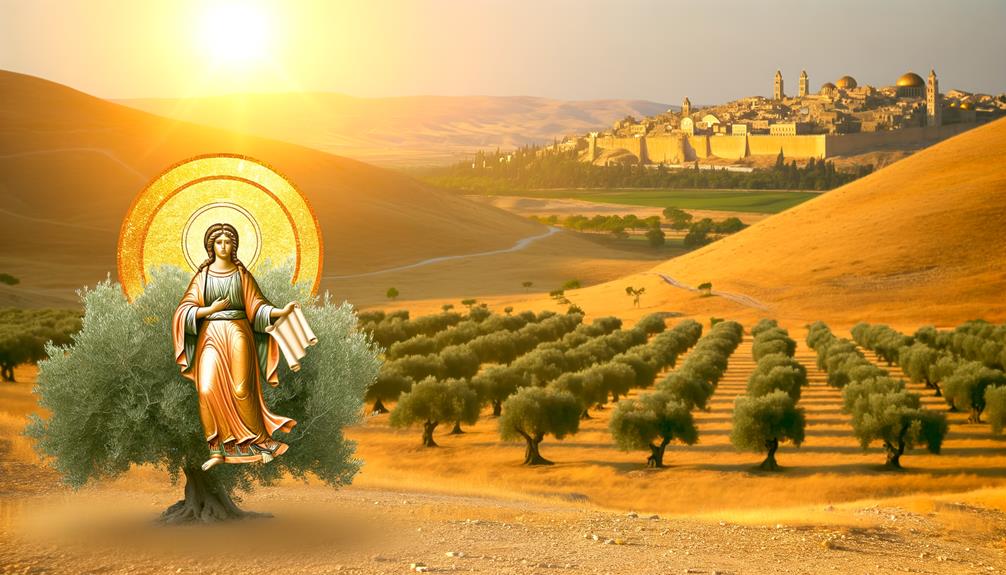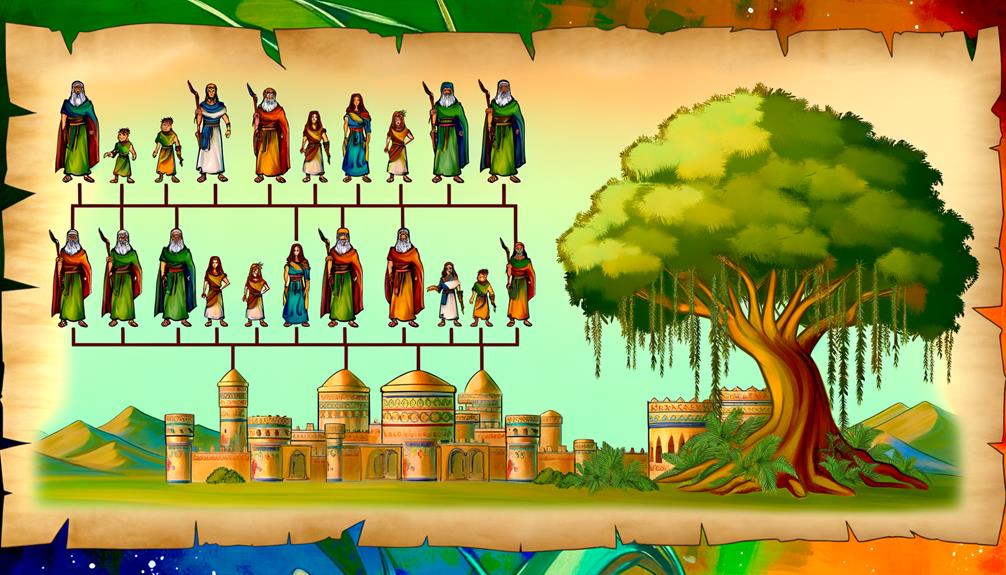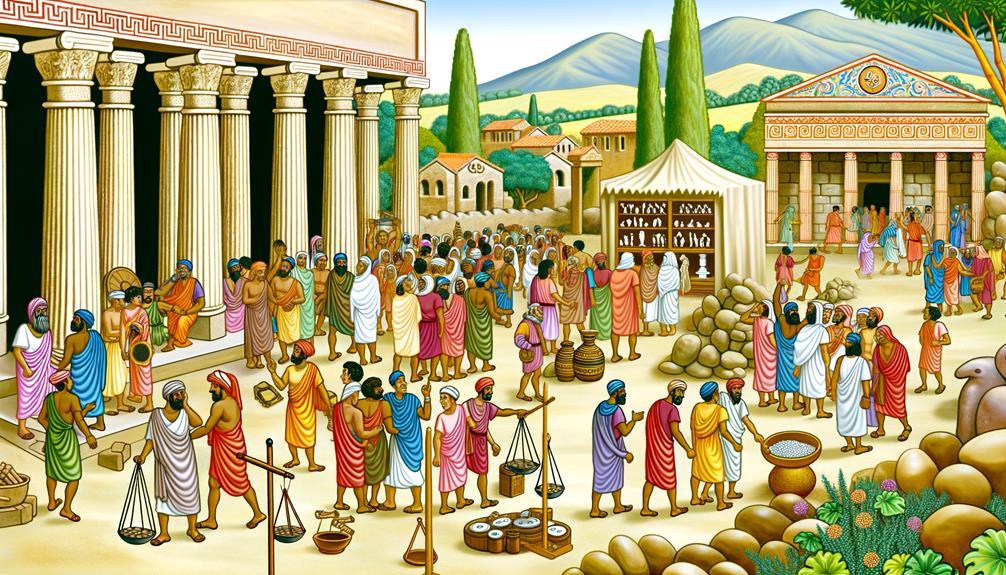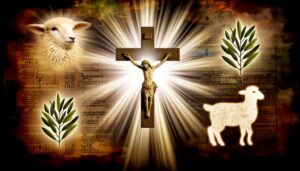Meaning of Javan in the Bible: Descendant of Noah
Javan, as delineated in the biblical genealogical texts such as Genesis 10:2 and 1 Chronicles 1:5, is identified as a son of Japheth and progenitor of the Ionian Greeks. This connection underscores a historical linkage between the biblical record and ancient Greek civilization.
Prophetic references in Isaiah and Ezekiel further emphasize Javan‘s significance, portraying him as a symbol of distant lands and maritime commerce. His lineage provides an essential perspective on the cultural and ethnic dissemination post-Flood, revealing divine orchestration in human history.
For an enriched understanding of Javan’s multifaceted role, further exploration of these texts is invaluable.

Meaning of Javan in the Bible: Lineage, Symbolism, and Historical Role
| Aspect | Details |
|---|---|
| Name Origin | Hebrew |
| Meaning | Greece / Ionian people |
| Biblical Reference | Genesis 10:2, Isaiah 66:19 |
| Role in Bible | Son of Japheth, grandson of Noah |
| Symbolism | Gentile nations, spread of civilization |
| Historical Significance | Associated with the Greek people (Ionians) |
Biblical References to Javan

The name Javan appears in several passages of the Bible, primarily in the genealogical and prophetic texts of the Old Covenant. The term is often associated with the descendants of Noah through Japheth, as observed in Genesis 10:2 and 1 Chronicles 1:5.
Additionally, Javan is mentioned in prophetic literature, particularly in Isaiah 66:19 and Ezekiel 27:13, where it signifies a distant land or people. These references suggest Javan’s historical significance and geographical implications within the biblical narrative.
The name is understood to correspond to the region of Ionia in ancient Greece, thereby emphasizing its broader cultural and historical context.
Analyzing these texts reveals Javan’s role in the interconnectedness of biblical genealogies and prophetic visions.
Javan’s Genealogical Context

Positioned within the Table of Nations, Javan’s genealogical context underscores his role as a progenitor of the Greek peoples, linking him directly to Japheth and consequently to Noah’s postdiluvian lineage.
This genealogical framework is essential for several reasons:
- Biblical Lineage: Javan is listed among the sons of Japheth in Genesis 10:2, establishing him within the broader narrative of human dispersion after the Flood.
- Ancestral Significance: This placement highlights the ancient roots of the Greek nations, suggesting a divinely ordained connection between Javan and subsequent Greek civilizations.
- Ethnic and Cultural Genesis: By tracing Javan’s lineage, scholars can explore the transmission of cultural and ethnic traits from Noah’s descendants to the Greeks, enriching our understanding of biblical ethnogenesis.
This context provides foundational insights into Javan’s biblical significance.
Javan and the Greek Connection

Javan’s connection to the Greek peoples, as delineated in biblical texts, offers a profound theological and historical link that underscores the convergence of divine prophecy and ancient civilizations.
In Genesis 10:2, Javan is listed as a son of Japheth, an ancestor of the maritime nations, which scholars correlate with the Ionian Greeks. This identification is supported by historical and linguistic evidence, considering the etymological similarity between ‘Javan’ and ‘Ionia,’ a region in ancient Greece.
The prophetic books, such as Isaiah and Ezekiel, also reference Javan in contexts that imply a connection to Hellenic territories.
This intertwining of biblical genealogies and Greek history highlights the broader narrative of human dispersion and divine orchestration as seen through the lens of scripture.
Historical Significance of Javan

The historical significance of Javan in biblical context is multifaceted, encompassing ancient Greek connections and numerous scriptural references.
As a progenitor of several nations, Javan’s lineage is explicated through his descendants, providing a genealogical bridge between biblical narratives and historical accounts of Greek civilizations.
Analyzing these aspects affords a deeper understanding of Javan’s role and impact within both theological and historical frameworks.
Ancient Greek Connections
Scholarly examination of ancient texts reveals that Javan, often identified with the Ionians of Greece, holds a significant place in the historical and theological narrative of the Bible.
The connection between Javan and the ancient Greeks is underscored by several critical aspects:
- Trade and Cultural Exchange: Evidence suggests that the Ionians engaged in extensive trade, disseminating Greek culture and ideas throughout the Near East.
- Military Engagements: Historical records indicate Greek mercenaries and soldiers played roles in various Near Eastern conflicts, influencing regional dynamics.
- Scriptural Associations: Javan is mentioned in prophetic and historical contexts, highlighting the perceived significance of Greek civilization in biblical times.
These points collectively underscore the intertwined histories of Javan and ancient Greece within biblical and historical scholarship.
Biblical References Found
Biblical texts reference Javan multiple times, illuminating its historical and theological relevance within the scriptural narrative.
Javan is first mentioned in Genesis 10:2, where he is listed as one of the sons of Japheth, thereby linking him to the broader genealogical framework of the nations. This reference situates Javan as an ancestral figure for the Greeks, reflecting ancient Israel’s awareness of their surrounding cultures.
Additionally, in Isaiah 66:19, Javan is mentioned in a prophetic context, indicating the dispersion of divine knowledge to distant lands.
Ezekiel 27:13 further emphasizes Javan’s significance in trade and commerce, portraying him as a key player in the economic exchanges of the ancient world, thereby underscoring his multifaceted role in biblical history.
Javan’s Descendants Explained
Rooted in the genealogical traditions of the Hebrew Scriptures, the descendants of Javan are historically significant for their association with the early Greek peoples, reflecting the intricate interplay between ancient Israel and its neighboring civilizations.
Javan, identified as a son of Japheth in the Table of Nations (Genesis 10), represents the progenitor of the Ionian Greeks. This connection underscores the broader historical and cultural interactions between these ancient societies.
Notably, the descendants of Javan can be categorized into three primary groups:
- Elishah: Linked to Hellenistic regions, possibly Cyprus.
- Tarshish: Often associated with maritime commercial hubs, potentially in southern Spain.
- Kittim: Identified with the island of Cyprus and other Mediterranean locales.
These groups illustrate the far-reaching influence of Javan’s lineage.
Javan in Prophetic Literature

The prophetic literature of the Bible often references Javan as a symbol of distant lands and peoples, illustrating broader themes of dispersion and divine sovereignty. In texts such as Isaiah 66:19, Javan represents the far reaches of the known world, emphasizing the omnipresence and omnipotence of God.
Ezekiel 27:13 portrays Javan as a trading partner of Tyre, shedding light on the interconnectedness of ancient civilizations under divine orchestration.
The inclusion of Javan in these prophetic contexts underscores the biblical narrative of God’s dominion over all nations, reinforcing the theological concept that no land is beyond His reach.
This portrayal serves to remind the faithful of God’s all-encompassing plan and the ultimate unity of His creation.
Cultural Impact of Javan

Building on the depiction of Javan in prophetic literature, the cultural impact of Javan extends to its historical and linguistic influences within the ancient Near Eastern context.
This influence can be observed in various domains:
- Trade and Commerce: Javan is often associated with maritime trade, reflecting the significant role of Greek merchants in ancient economies.
- Military Alliances: Biblical texts allude to Javan in the context of military alliances, indicating the geopolitical importance of the region.
- Cultural Exchange: The spread of Hellenistic culture following Alexander the Great’s conquests underscores Javan’s role in the diffusion of Greek culture and ideas.
These facets illustrate Javan’s far-reaching impact, shaping socio-economic, military, and cultural paradigms in the biblical world.
Linguistic Roots of Javan

The etymology of the name Javan, as found in biblical texts, traces its linguistic roots to the Hebrew word ‘Yavan,’ which is thought to be connected to the ancient Greek region of Ionia.
This historical linguistic connection signifies a broader interaction between Semitic and Hellenic cultures, reflecting a complex web of historical and theological implications.
Analyzing these connections offers profound insights into the cultural and linguistic interplay present in biblical narratives.
Etymology of Javan
Etymologically, the name Javan traces its roots to the Hebrew word ‘Yāwān,’ which is associated with the ancient Ionian Greeks. This etymology provides a rich tapestry of linguistic and cultural connections that are essential for understanding biblical references.
Examining the Hebrew term ‘Yāwān’ reveals:
- Geographical Significance: It denotes a specific Hellenic region, reflecting significant interaction between Hebrew and Greek civilizations.
- Cultural Interchange: The term encapsulates the exchange of ideas, trade, and cultural practices between these ancient societies.
- Scriptural Context: Its usage in biblical texts underscores the historical and prophetic dimensions, often symbolizing broader themes of exile and diaspora.
Historical Linguistic Connections
Examining the historical linguistic connections of the name Javan reveals an intricate web of interactions between Semitic and Indo-European languages, underscoring its significant role in biblical narratives.
The name Javan, derived from the Hebrew ‘Yavan,’ is linked to the Greek ‘Ionia,’ reflecting ancient Greek influence. Linguistic evidence suggests that Javan represents the Hellenic peoples, emphasizing the cultural and historical intersections between the Hebrews and the Greeks.
The term’s presence in biblical texts points to a recognition of Greek civilization’s prominence and its impact on the Near Eastern world. This connection highlights the fluid boundaries of cultural identities and the shared linguistic heritage that shaped the biblical understanding of nations and their origins.
Javan’s Legacy in Modern Times

Javan’s influence in contemporary culture can be observed through various linguistic, cultural, and historical manifestations that trace back to ancient biblical references. The continuation of Javan’s legacy is evident in multiple areas:
- Linguistic Impact: The term ‘Ionian’ in modern Greek and ‘Yavan’ in Hebrew both trace their etymology to Javan, reflecting the enduring linguistic connections.
- Cultural Heritage: Greek civilization, often identified with Javan, has profoundly shaped Western philosophy, art, and democracy.
- Historical Significance: Ancient texts and archaeological findings underscore Javan’s role in the development of early Mediterranean societies.
Such elements illustrate how the ancient figure of Javan continues to resonate, influencing various facets of contemporary understanding and cultural identity.
Conclusion
The figure of Javan in biblical literature serves as an essential link between ancient Semitic and Hellenistic worlds. Genealogically rooted in Noah’s lineage, Javan is traditionally identified with the Ionian Greeks, underscoring a significant historical and cultural connection.
Prophetic texts further elevate Javan’s role, symbolizing broader geopolitical shifts. This analysis reaffirms Javan’s multifaceted significance, suggesting that studying Javan offers invaluable insights into the interplay between ancient civilizations and their enduring legacies.






